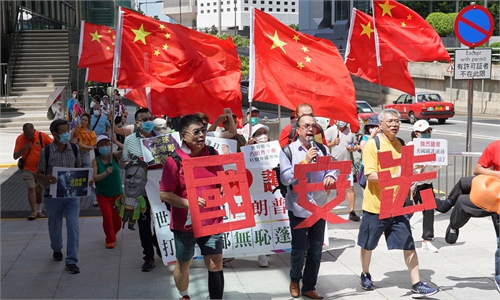Hong Kong financial chief defends national security law ahead of its expected release

Chinese lion statue at Victoria peak, the famous viewpoint and tourist attraction in Hong Kong Photo: VCG
Hong Kong has fully accessed and prepared for potential economic sanctions threatened by US officials over the impending National Security Law, Hong Kong's Financial Secretary Paul Chan Mo-po said on Sunday, as he offered a staunch defense of the law calling it a boost not a drag on the city's economic outlook.
Chan's latest comments in support of the law came as foreign officials and media outlets have relentlessly pushed fearmongering narratives that even claim the end is nigh for the city's status as an international financial and commerce hub, as Chinese lawmakers are expediting the legislative process of the law that is expected to be finalized as early next week.
In a blog post published on Sunday, Chan said that the threatened sanctions by the US over the National Security Law has directed attention to the potential impact and added more uncertainty at a time of persistent tension in the China-US relationship.
"The government of the Hong Kong Special Administration Region has made a full assessment of this and has made contingency plans accordingly," Chao wrote, stressing that national security is both a responsibility and obligation that Hong Kong cannot ignore and that when prepared and vigilant, "Hong Kong fears no storm and will move forward firmly."
Since China's National People's Congress (NPC), the country's top legislative body, voted in May on a draft of the National Security Law for the Hong Kong Special Administrative Region, US officials have threatened to impose sanctions, including scrapping a special trade arrangement for Hong Kong, if China's moves forward with the law.
On Thursday, the US Senate passed a law that seeks to impose mandatory sanctions on people and companies that the US deems to have helped China's efforts to restrict Hong Kong's autonomy. On Friday, US Secretary of State Mike Pompeo said the US was imposing visa restrictions on Chinese officials.
Chinese officials have harshly pushed back against those moves, calling them flagrant interference in China's internal affairs in Hong Kong, and vowed countermeasures if the US follows through. Experts have also dismissed the US moves as trivial that won't affect China's determination to pass the National Security Law.
Liang Haiming, chairman of the China Silk Road iValley Research Institute and a Hong Kong economist, said that the US won't dare "touch Hong Kong" because US President Donald Trump needs the China-US phase one trade agreement to "score" political points and the threats are aimed at gaining more bargaining chips.
"Trumps is just making a threat hoping the Chinese government will give him some advantage that will help him get reelected," Liang told the Global Times on Sunday.
Liang noted that the Senate bill would still take at least three or four months before it becomes law and by then Trump will be focused on the presidential election.
In Beijing, Chinese lawmakers are moving the legislation forward. The draft law has been added to the agenda of the meeting of the NPC's Standing Committee that started on Sunday. Some experts have said that the draft could be adopted during the three-day session and released and implemented immediately after its passage.
In his blog post on Sunday, Chan cited his interactions with the city's banking and financial sectors, who told him the law is conducive to restoring order and security in Hong Kong, which in turn is good for business, investment and life in the city.
Contrary to media reports of capital flight, there has been no "significant" capital outflows and the Hong Kong dollar remains on the "strong side at 7.75 per US dollar," Chan argued, noting that if Hong Kong fully utilizes the advantages offered by the "one country, two systems," and proactively integrates into the national development strategy, it can "definitely ensure Hong Kong's long-term economic development."


